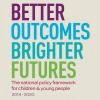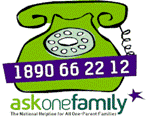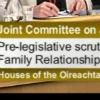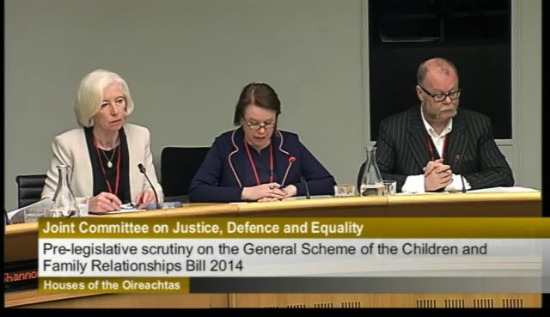Press Release
Family Day Festival celebrates family diversity of today’s Ireland on 18 May
(Dublin, 18 April 2014) One Family – Ireland’s leading organisation for one-parent families in Ireland – celebrates the diversity of families in today’s Irish society with the free one-day Family Day Festival in Dublin’s Iveagh Gardens on Sunday, 18 May 2014 from 11am to 5pm.
This is the fourth year of the annual celebration, which attracted almost 10,000 attendees in 2013, and also the 20th anniversary of UN International Year of the Family which encourages a refocus on the role of families and on family policy development, offering the opportunity to share good practices in family policy making and to review challenges faced by families worldwide and recommend solutions. UN International Day of Families, the inspiration for One Family’s founding of the Family Day Festival, takes place on 15 May annually.
Everyone is invited to celebrate their family and all families on Sunday 18 May in acknowledgment of the wonderful diversity and reality of families in today’s Ireland. Families are not all the same and Mother’s Day and Father’s Day exclude many. The Family Day Festival embraces the UN definition of family which refers to two or more people, bound together by mutual consent, birth and/or adoption or placement who together care for each other. It celebrate all types of family – one-parent families, step families, the traditional married family, adoptive and foster families, blended and extended families, those with opposite and same sex parents.
The Festival offers free entertainment and fun for every age. Adults and children can enjoy arts and crafts, performance and storytelling workshops from organisations such as the National Print Museum, The Ark, Imaginosity, Fighting Words and the Gaiety School of Acting; create their own masterpieces to take home; and participate in traditional sports and games.
They will be entertained by performers including MC Brian Daly, magician extraordinaire who can tickle the funny bones of every age, and musicians, dancers and performers. They can avail of the opportunity to engage with organisations providing services for families from advice to family-friendly holidays, and chat with those working towards equality for all families in Ireland. Tasty food from around the world will be on sale or families can bring their own picnics. The Family Day Festival aims to provide a brilliant, packed day out with a great variety of fun activities accessible to all without the need to spend any money.
Karen Kiernan, Director of One Family, commented: “Although our Constitution still does not acknowledge the reality of the diversity of families and this must change, this is a landmark time with the new Children and Family Relationships Bill intending to provide legal clarity on parental rights in diverse family forms, and Better Outcomes: Brighter Futures, the National Policy Framework for Children and Young People 2014-2020 published this week. The Family Day Festival creates a chance to celebrate all families while having a lot of fun. Everyone around the country can enjoy it with their family members and friends and wish everyone a Happy Family Day!”
Those who cannot attend the festivities in the Iveagh Gardens are encouraged to host their own Family Day event which can be included on the Family Day site by emailing details to familyday@onefamily.ie.
The Family Day Festival is supported by the Community Foundation of Ireland, the Office of Public Works and Dublin City Council.
Further information is available on www.familyday.ie where the full programme of events will soon be available.
/Ends.
About One Family
One Family was founded in 1972 as Cherish and is Ireland’s leading organisation for one-parent families, providing services to people parenting alone, sharing parenting and going through family transitions. Its policy work is rooted in its extensive family support work over the past four decades. Children are at the centre of this work and the organisation helps all the adults in their lives, including mums, dads, grandparents, step-parents, new partners and other siblings, offering a holistic model of specialist family support services. These services include the lo-call askonefamily national helpline on 1890 622 212, counselling, and provision of training courses for parents and for professionals. For further information, visit www.onefamily.ie.
Listings
Family Day Festival | A celebration of the diversity of the family with free entertainment, games, workshops and fun for all ages | Sunday, 18 May 2014 | Iveagh Gardens, Dublin 2 | 11am – 5 pm | Free | 01 662 9212 | www.familyday.ie
For Images or Further Information
Shirley Chance, Director of Communications, One Family | t: 01 662 9212 or 087 414 8511 | e: schance@onefamily.ie
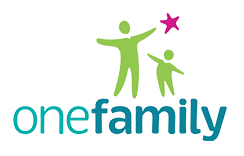


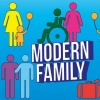
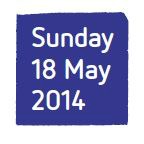

 For some parents the school holiday is a respite time with a more relaxed routine. However, it can be a nightmare for others for many reasons such as not being able to take time off work, lack of childcare options and tight budgets, and so requires a lot of planning and management. As parents we learn quickly that when raising children it is important to develop as many resources as we possibly can. As part of our ’10 Ways to …’ series of weekly parenting tips, and in celebration of mid-term break, here are our tips on how to make school breaks enjoyable for all members of the family so you won’t hear the infamous “I’m bored” – hopefully!
For some parents the school holiday is a respite time with a more relaxed routine. However, it can be a nightmare for others for many reasons such as not being able to take time off work, lack of childcare options and tight budgets, and so requires a lot of planning and management. As parents we learn quickly that when raising children it is important to develop as many resources as we possibly can. As part of our ’10 Ways to …’ series of weekly parenting tips, and in celebration of mid-term break, here are our tips on how to make school breaks enjoyable for all members of the family so you won’t hear the infamous “I’m bored” – hopefully!